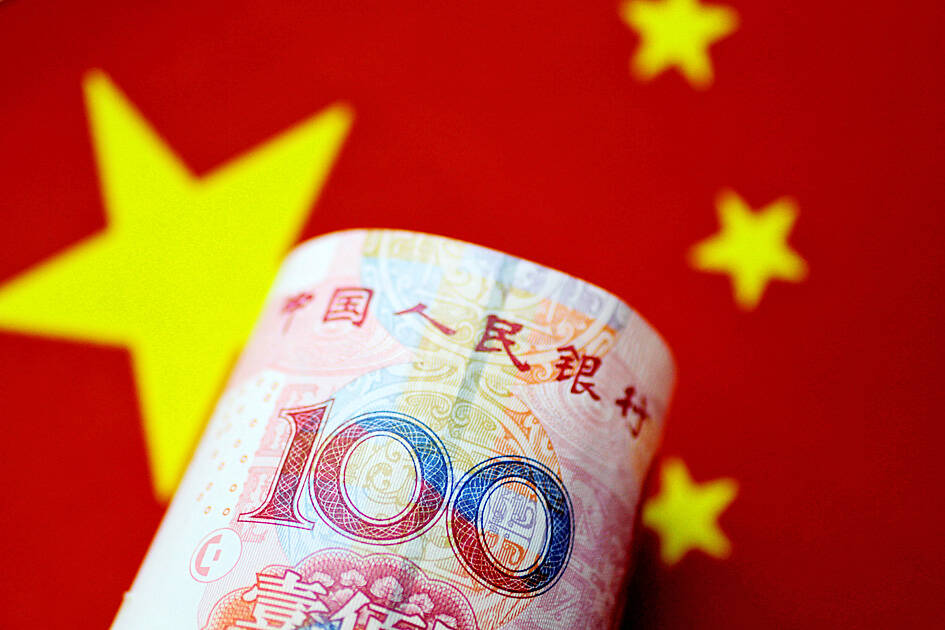China’s Taiwan Affairs Office (TAO) last month convinced 18 senior representatives of a Taiwanese business association in China not to attend an investment event in Kinmen County as part of attempts to interfere with Taiwan’s elections, a source said yesterday.
The Kinmen event, hosted by the Straits Exchange Foundation (SEF) — the quasi-official intermediary body authorized by the government to negotiate matters of a technical or business nature with China — was aimed at encouraging Taiwanese businesses in China to invest in Taiwan.
However, the TAO contacted senior business representatives by telephone and told them not to attend the event, the source said.

Photo: Reuters
The TAO in August organized a separate investment event in China for “Taiwanese compatriots,” at which representatives of Taiwanese business associations in Xiamen and Kunshan criticized Vice President William Lai (賴清德) for a trip he made to the US in August.
“This was all organized by Beijing as part of efforts to influence the outcome of Taiwan’s upcoming presidential election,” the source said.
When the SEF event was held last month, none of the 18 senior business representatives contacted by the TAO attended the event, likely due to fear of retaliation from Beijing if they did, the source said.
“In both situations — when instructed to criticize Lai, and when told not to attend the SEF event — Taiwanese businesspeople in China were powerless to object, due to fear of reprisal,” the source said.
Despite the TAO’s interference, there were still hundreds of participants at the SEF event, and many businesses have since relocated from China to Taiwan or to a third country, the source said.
Many Taiwanese businesses that previously operated in China have moved operations to Taiwan due to the Democratic Progressive Party’s policies, National Cheng Kung University political science professor Hung Chin-fu (洪敬富) said yesterday.
“This is also a vote of no confidence in the Chinese economy under the leadership of Chinese President Xi Jinping (習近平),” he said.
“We are likely to see Beijing continue to use Taiwanese businesspeople and business associations in attempts to interfere with the elections,” he added.

AGING: As of last month, people aged 65 or older accounted for 20.06 percent of the total population and the number of couples who got married fell by 18,685 from 2024 Taiwan has surpassed South Korea as the country least willing to have children, with an annual crude birthrate of 4.62 per 1,000 people, Ministry of the Interior data showed yesterday. The nation was previously ranked the second-lowest country in terms of total fertility rate, or the average number of children a woman has in her lifetime. However, South Korea’s fertility rate began to recover from 2023, with total fertility rate rising from 0.72 and estimated to reach 0.82 to 0.85 by last year, and the crude birthrate projected at 6.7 per 1,000 people. Japan’s crude birthrate was projected to fall below six,

Conflict with Taiwan could leave China with “massive economic disruption, catastrophic military losses, significant social unrest, and devastating sanctions,” a US think tank said in a report released on Monday. The German Marshall Fund released a report titled If China Attacks Taiwan: The Consequences for China of “Minor Conflict” and “Major War” Scenarios. The report details the “massive” economic, military, social and international costs to China in the event of a minor conflict or major war with Taiwan, estimating that the Chinese People’s Liberation Army (PLA) could sustain losses of more than half of its active-duty ground forces, including 100,000 troops. Understanding Chinese

US President Donald Trump in an interview with the New York Times published on Thursday said that “it’s up to” Chinese President Xi Jinping (習近平) what China does on Taiwan, but that he would be “very unhappy” with a change in the “status quo.” “He [Xi] considers it to be a part of China, and that’s up to him what he’s going to be doing, but I’ve expressed to him that I would be very unhappy if he did that, and I don’t think he’ll do that. I hope he doesn’t do that,” Trump said. Trump made the comments in the context

SELF-DEFENSE: Tokyo has accelerated its spending goal and its defense minister said the nation needs to discuss whether it should develop nuclear-powered submarines China is ramping up objections to what it sees as Japan’s desire to acquire nuclear weapons, despite Tokyo’s longstanding renunciation of such arms, deepening another fissure in the two neighbors’ increasingly tense ties. In what appears to be a concerted effort, China’s foreign and defense ministries issued statements on Thursday condemning alleged remilitarism efforts by Tokyo. The remarks came as two of the country’s top think tanks jointly issued a 29-page report framing actions by “right-wing forces” in Japan as posing a “serious threat” to world peace. While that report did not define “right-wing forces,” the Chinese Ministry of Foreign Affairs was